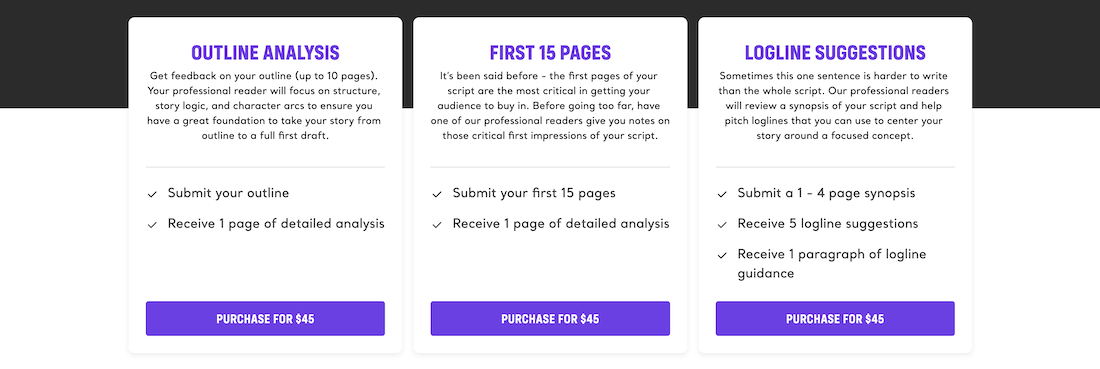7 Ways Screenwriters Can Avoid Getting Ripped Off

I’ve been around the film and television industry block for almost 25 years now—nearly 18 years as a pro screenwriter. So, trust me, I know a thing or two about how screenwriters get ripped off.
To be frank, it pisses me off. I’m protective of my screenwriting peers.
With that in mind, here are seven ways you can avoid getting ripped off as a screenwriter.
1. Never Get Ripped Off By Buying Representation
This should be an obvious one, but throughout my years I’ve come across dozens upon dozens of screenwriters who fall into the same trap—paying for representation.
Here are five words to live by as a newcomer in the screenwriting world:
- You
- Never
- Pay
- For
- Representation
Agents and managers work for you. You’ll come across plenty claiming to be agents and managers. You’ll hear claims that they “only” charge for office supplies, script coverage, and notes. After that, they’ll claim that they’ll take your scripts to the highest tiers of Hollywood.
Five words once again (all together, class):
- You
- Never
- Pay
- For
- Representation
“But what if it’s just for…”
STOP.
“But what if they’ve worked on big movies and for big companies…”
STOP!
- You
- Never
- Pay
- For
- Representation
Read More: How To Get Representation for Your Writing
2. Don’t Buy Coverage with the Promise That They Will Take Your Script to Hollywood
Look, paying for coverage isn’t a horrible thing. You just shouldn’t rely on it. Make sure the company offering the coverage is legit and the people writing the coverage have some good company credits and resumes (experience working for major production companies, studios, streamers, management companies, and agencies).
But, if you ever hear them saying that when your script is ready (likely after multiple purchases of coverage) they will take it out to so and such, run away.
Script consultants and coverage writers will want to build your hope—and they’ll use that to get you to buy more and more coverage and notes packages.
- You
- Never
- Pay
- For
- Representation
3. Avoid Most Screenwriting Contest Beyond the Proven Ones
Too many novice screenwriters try to submit to as many contests as they can, hoping that being able to put “award-winning screenplay” in a query email is going to get them a sale or assignment.
Hollywood doesn’t care about whether your script won the Midwestern Screenwriting Contest (hopefully there is no such contest, but there probably is). The only “award-winning” element they care about is if your sample won an Oscar or Emmy.
There are hundreds of screenwriting contests out there. Most of them are ripping you off because they don’t really have any real connection with Hollywood.
In short, they can’t help you beyond doing what you can be doing on your own as far as querying major production companies, management companies (agencies don’t take queries), etc.
Don’t get me wrong. Screenwriting contests, competitions, and fellowships can benefit novice screenwriters. You just need to know which ones are worth your time. Don’t be enchanted by cash prizes. The real value is the potential exposure you can get from their Hollywood contacts.
- The Nicholl Fellowship
- The Sundance Institute Programs
- Various Studio and Streamer Programs
- Final Draft’s Big Break
- ScreenCraft’s Fellowship and Genre Contests
Those are the big five. Don’t listen to what major pundits say about contests—even ScreenCraft’s. Don’t even listen to what major Hollywood screenwriters with blogs say about them. Trust me, these types of contests and fellowships with true connections to Hollywood can help novice screenwriters get their foot in the door.
But you need to choose wisely. Do your homework. And even if you go to the big ones, don’t rely on them.
- Enter to test the waters of your script.
- Forget you entered and move on to the next script.
- If you place, reap any and all benefits and continue forward.
Read More: How This Screenwriter Used Contest Feedback To Find His Future Representation
4. Don’t Waste Money Registering Your Scripts
Whether you’re trying to pay for registration with the Writers Guild of America or US Copyright, it’s a waste of your time and money.
It’s fairly simple:
- Only share your work with reputable companies and industry insiders.
- Check their credits—and those credits better be major and up-to-date.
I’ve earned six figures over the 18-year span of my pro screenwriting career, dealing with multiple producers, executives, managers, agents, cast, and crew. I’ve never registered a spec script with the WGA or US Copyright. And I’ve never been ripped off. Why? Because I do my homework and only approach or accept correspondence from legit industry insiders.
Hollywood is afraid to be sued. They are risk averse. Sure, some can be sneaky (see below), but most don’t want to steal your ideas.
The WGA registration is something no industry insider cares about, as far as whether or not the script has a WGA Registration Number. They don’t care. The registration can only be used in basic arbitration to prove that a version of the script was written at a certain date. It’s not really admissible in court. US Copyright is virtually useless because you’d have to register it for each draft you write.
As soon as you write the script, the copyright belongs to you—until you either sell it or sign over the rights to someone.
So, save your time and money. Just be smart and only share your script with reputable people and entities.
5. Avoid Getting Ripped Off With Back-End Promises
“Sign over the rights and you’ll get paid when they sell it,” they say.
“They’ll split the deal 50/50,” they say.
“We’ll share the profits of the finished product,” they say.
Back-end deals are scams. And if they are not outright scams, they are a waste of time because real industry players don’t work that way. THEY SIGN YOU TO A CONTRACT AND PAY YOU.
6. Avoid Free Concept Pitching in Industry Meetings and Calls
I went to a general meeting at a major studio years ago. My manager at the time got me the meet-and-greet meeting after the studio liked one of my submitted sample specs. By the end of the meeting, it was clear they weren’t going to buy my script. However, they were charming and said they loved my writing.
Then, they mentioned they were developing a sequel to one of their popular hits. They wanted to know if I had any ideas on how to approach the sequel.
I told them I would think it over. They tried to have me spitball, but I wisely told them I’d rather gather my thoughts in writing.
I told my manager at the time about it and he laughed, “Yeah, don’t do that. They’re trying to get free work out of you.”
Which leads us to #7…
7. The Biggest Way to Get Ripped Off—Writing for Free
You are a screenwriter. Screenwriters get paid to develop and write screenplays. Some producers and executives will try to get you to do development work (outlines and treatments) and rewriters for free. You might feel compelled to do the work, especially when they promise that you'll be hired if they get what they want from your free efforts.
Too many screenwriters are doing this. STOP. The more screenwriters who do this, the more difficult it is for screenwriters to do what I’m going to suggest—kindly say that if they want outlines, treatments, or rewrites done, you’ll happily sign a contract to be paid to do so.
Here are some things you shouldn't expect payment for:
- Writing loglines
- Writing a synopsis
- Doing a polished draft strictly to make the aesthetics of the script (grammar, edited-down description, format, etc.) presentable
- Pitch deck work
You should get paid for everything else (or you are being ripped off):
- Outlines
- Treatments
- Script drafts
- Rewrites
You’re being ripped off if you’re working for free.
Read More: How I Landed 10 Feature Script Deals in Four Years (Without an Agent)
Check out our Preparation Notes so you start your story off on the right track!

Ken Miyamoto has worked in the film industry for nearly two decades, most notably as a studio liaison for Sony Studios and then as a script reader and story analyst for Sony Pictures.
He has many studio meetings under his belt as a produced screenwriter, meeting with the likes of Sony, Dreamworks, Universal, Disney, Warner Brothers, as well as many production and management companies. He has had a previous development deal with Lionsgate, as well as multiple writing assignments, including the produced miniseries Blackout, starring Anne Heche, Sean Patrick Flanery, Billy Zane, James Brolin, Haylie Duff, Brian Bloom, Eric La Salle, and Bruce Boxleitner, the feature thriller Hunter’s Creed, and many Lifetime thrillers. Follow Ken on Twitter @KenMoviesand Instagram @KenMovies76
Get Our Screenwriting Newsletter!
Get weekly writing inspiration delivered to your inbox - including industry news, popular articles, and more!






























